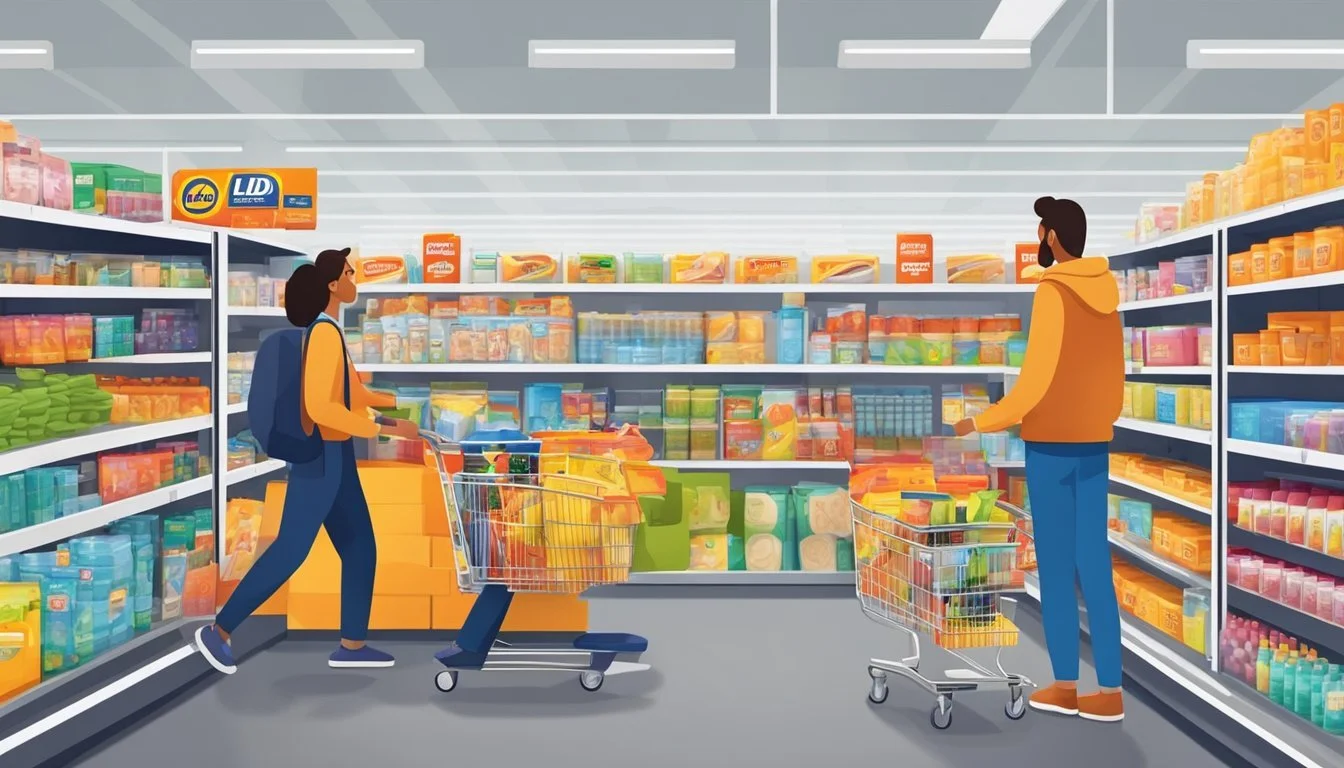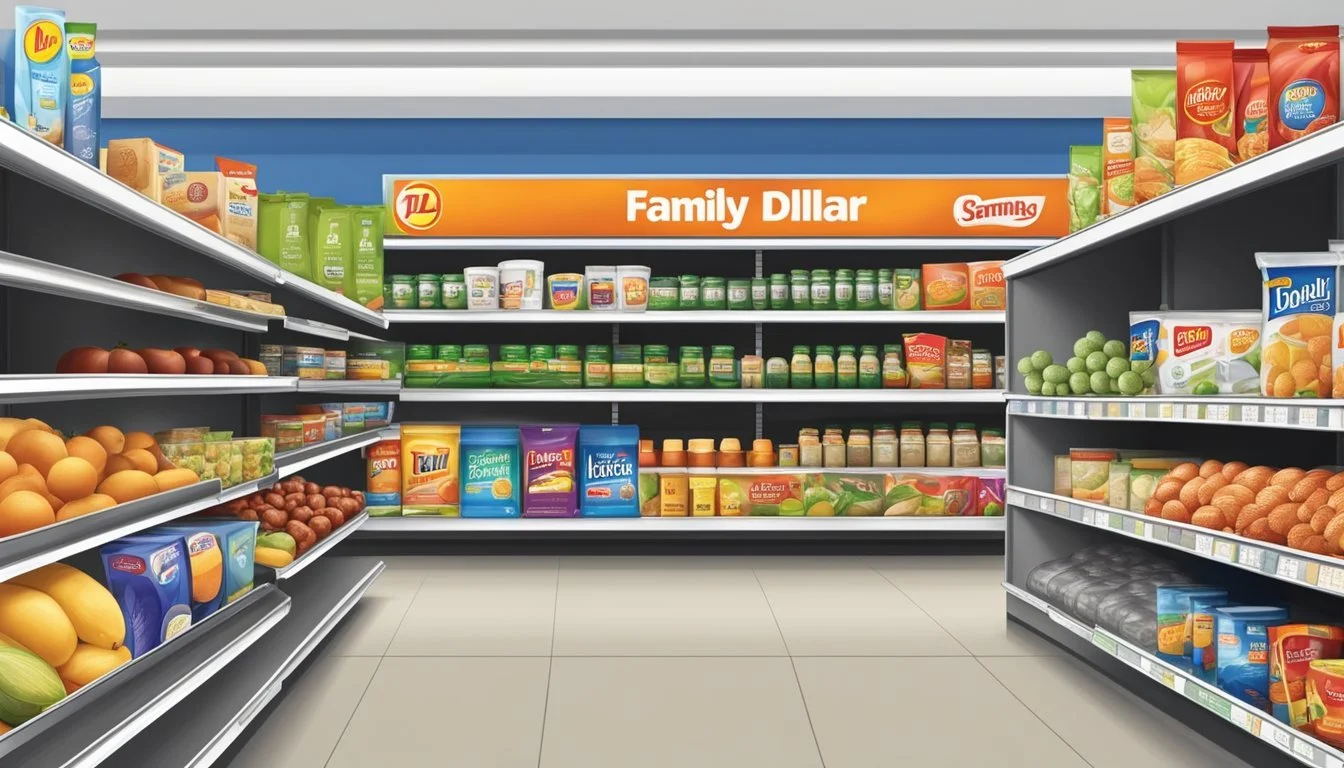Family Dollar vs Lidl
A Price and Quality Comparison
Family Dollar and Lidl represent two distinct approaches to budget-friendly grocery shopping. While both aim to provide affordable options for consumers, they differ significantly in their product offerings, store layouts, and overall shopping experiences.
Family Dollar focuses on a wide range of household items, including some groceries, at discount prices. Lidl, on the other hand, is primarily a grocery store with a carefully curated selection of high-quality products at competitive rates. Lidl generally offers better value for money on groceries, with fresher produce and a larger variety of food items compared to Family Dollar.
Both stores cater to budget-conscious shoppers, but Lidl's emphasis on fresh foods and its European-style approach to grocery retail sets it apart. Family Dollar serves as a convenient option for quick purchases of household essentials and some packaged foods, while Lidl provides a more comprehensive grocery shopping experience.
Company Overviews
Family Dollar and Lidl are two distinct grocery chains with unique histories and approaches to retail. Their shopping experiences differ in layout, product offerings, and overall atmosphere.
History and Background
Family Dollar was founded in 1959 by Leon Levine in Charlotte, North Carolina. The chain rapidly expanded across the United States, focusing on providing affordable household goods and groceries to low and middle-income families. In 2015, Dollar Tree acquired Family Dollar, creating a combined network of over 15,000 stores.
Lidl, on the other hand, originated in Germany in 1973. Founded by Josef Schwarz, Lidl began as a small grocery store before expanding across Europe. The company entered the U.S. market in 2017, bringing its no-frills approach to American consumers.
Shopping Experience
Family Dollar stores offer a wide range of products, including groceries, household items, and seasonal goods. The stores are typically smaller than traditional supermarkets, emphasizing convenience and quick shopping trips.
Lidl focuses on efficiency and low prices. Stores stock a limited number of items, with a strong emphasis on private-label products. Lidl's European-style bakery and wine sections are notable features. The checkout process is streamlined, with customers bagging their own groceries.
Store Layout and Design
Family Dollar stores have a simple layout with clearly marked aisles. Products are often displayed in cardboard boxes or on basic shelving units. The stores have a no-frills atmosphere, prioritizing function over aesthetics.
Lidl stores feature a more modern design with wider aisles and natural lighting. The layout is open, with a central aisle showcasing weekly specials. Fresh produce is prominently displayed near the entrance. Lidl's stores are typically larger than Family Dollar locations, allowing for more spacious shopping areas and a broader product range.
Product Offerings
Family Dollar and Lidl offer distinct product ranges catering to different consumer needs. Their selections vary in quality, variety, and specialty options.
Quality and Variety of Products
Family Dollar focuses on budget-friendly everyday essentials. Their shelves stock pantry staples like pasta, flour, and canned goods. The produce section is limited, with a small selection of fruits and vegetables. Meat options are typically frozen or processed. Family Dollar carries name-brand items alongside their private-label products.
Lidl provides a wider array of fresh produce, meats, and bakery items. Their stores feature an in-house bakery producing fresh bread daily. Lidl's meat department offers a variety of cuts and options. The chain emphasizes quality and freshness in their produce section.
Specialty and Store-Brand Items
Family Dollar's private-label products cover basic household needs. Their store brands focus on affordability rather than premium quality. Specialty items are limited, with occasional seasonal offerings.
Lidl excels in specialty and store-brand items. Their Preferred Selection line features gourmet options at competitive prices. Lidl's private-label products often match or exceed the quality of name brands. The chain rotates unique, limited-time specialty items weekly, similar to Aldi's "Aldi Finds" concept.
Pricing and Affordability
Family Dollar and Lidl both aim to offer low prices, but their pricing strategies and value propositions differ. Let's examine how these discount grocers compare on affordability and overall value for shoppers.
Comparison of Pricing Strategies
Family Dollar focuses on everyday low prices across its product range. The chain keeps costs down through a no-frills store design and limited selection of mostly private label items. Family Dollar often uses multi-buy deals and dollar pricing to attract budget-conscious shoppers.
Lidl takes a different approach. The German discounter offers rock-bottom prices on staples while mixing in premium and organic options. Lidl's pricing is generally aggressive, especially on fresh produce and bakery items. The chain runs weekly specials and uses limited-time deals to drive traffic.
Both stores use private labels extensively to keep prices low. However, Lidl tends to offer more brand-name products alongside its store brands.
Value for Money
When it comes to overall value, Lidl often edges out Family Dollar. Lidl's larger stores and wider selection give shoppers more options. The chain's fresh departments, including produce, meat, and bakery, are particularly strong on quality and price.
Family Dollar shines for convenience items and household basics. Its smaller format makes quick trips easy. The chain's "$1 WOW" deals can offer significant savings on select items.
Lidl's "Lidl Surprises" section of rotating non-food items provides unique value. Family Dollar counters with its "Smart Coupons" program for digital savings.
Both stores offer satisfaction guarantees, but Lidl's policies are generally more generous. Lidl's "Love it or Money Back" guarantee covers all private label products.
Customer Experience and Policies
Family Dollar and Lidl offer distinct shopping experiences with differing store layouts, product selections, and customer service approaches. Both chains have implemented policies and practices aimed at engaging shoppers and ensuring satisfaction.
Service and Store Policies
Family Dollar focuses on providing affordable goods in convenient neighborhood locations. Stores typically have a no-frills layout with basic shelving and minimal decor. The chain offers a satisfaction guarantee on private label products. Lidl, in contrast, emphasizes a more upscale shopping environment with wider aisles and modern fixtures. Lidl provides a "Love It Guarantee" allowing customers to return any item for a full refund within 30 days.
Family Dollar generally accepts manufacturer coupons but does not offer a store loyalty program. Lidl runs weekly specials and promotions through its app but does not accept manufacturer coupons. Both chains provide reusable shopping bags for purchase, with Lidl encouraging customers to bring their own bags.
Shopper Engagement
Family Dollar aims to create a quick, convenient shopping trip for essentials and household goods. Stores stock a limited assortment focused on everyday needs. The average basket size tends to be smaller, with customers often making frequent trips for a few items.
Lidl works to engage shoppers through an ever-changing selection of limited-time merchandise. The chain's "Lidl Surprises" section features rotating non-grocery items like clothing, tools, and home goods. This treasure hunt atmosphere encourages repeat visits. Lidl also emphasizes its fresh produce and in-store bakery to attract shoppers.
Both retailers strive for efficient checkout processes to minimize wait times. Family Dollar typically has fewer registers open, while Lidl employs a sit-down checkout model common in Europe.
Regional and Demographic Reach
Family Dollar and Lidl have distinct regional presences and cater to different shopper demographics across the United States. Their market strategies and product offerings reflect the diverse needs of their target customers.
Market Footprint in Different Regions
Family Dollar boasts a widespread presence across the United States, with over 8,000 stores in 46 states. The chain focuses heavily on rural and urban areas, particularly in the South and Midwest.
Lidl, in contrast, has a more limited footprint. The German retailer entered the U.S. market in 2017 and operates primarily on the East Coast. Lidl has approximately 170 stores across nine states, including Virginia, North Carolina, and New Jersey.
Catering to Diverse Shopper Needs
Family Dollar targets low to middle-income shoppers, offering a mix of everyday essentials and discount merchandise. The chain emphasizes convenience and affordability, with smaller store formats suitable for quick trips.
Lidl appeals to a broader demographic range, attracting budget-conscious and quality-seeking customers alike. The retailer is known for its fresh produce, in-house bakery, and rotating selection of specialty items.
Lidl's stores are typically larger than Family Dollar's, providing a more comprehensive grocery shopping experience. This approach allows Lidl to compete with traditional supermarkets while maintaining competitive pricing.
Product Selection and Availability
Family Dollar and Lidl offer distinct shopping experiences with varying product ranges and inventory management approaches. Each store has its strengths and weaknesses in terms of selection, freshness, and availability.
Inventory Management and Stock Levels
Family Dollar typically carries a limited selection of grocery items, focusing more on household goods and non-perishables. Their stock levels can be inconsistent, with popular items sometimes out of stock. Pantry staples like canned goods and snacks are usually well-stocked.
Lidl, on the other hand, maintains a wider range of groceries. Their inventory management system ensures better availability of fresh produce, meats, and dairy products. Lidl stores often have fully stocked shelves with a variety of options in each category.
Lidl's bakery department is a standout feature, offering freshly baked breads and pastries throughout the day. Family Dollar lacks this department entirely.
Freshness and Quality of Perishables
Lidl prioritizes fresh produce and meats, often sourcing from local suppliers. Their fruits and vegetables, such as apples and cabbage, are generally of good quality and competitively priced. The meat section at Lidl includes options like chicken and salmon, with a focus on freshness.
Family Dollar's produce selection is limited and may not always be as fresh. They typically offer a small range of basic fruits and vegetables, but the quality can be inconsistent.
Lidl's dairy section includes a variety of cheeses and eggs, while Family Dollar's options are more basic. Both stores carry staples like sliced cheese and eggs, but Lidl often has a broader selection and better quality.
Additional Services and Offerings
Family Dollar and Lidl both offer more than just groceries. These stores provide diverse product lines and special promotions to attract customers and enhance their shopping experience.
Non-Grocery Product Lines
Family Dollar stocks a wide range of non-food items. These include household goods, cleaning supplies, and personal care products. The store also carries basic clothing, toys, and seasonal decorations.
Lidl, on the other hand, focuses on a rotating selection of non-grocery items. Their "Middle of Lidl" aisle features weekly deals on kitchen appliances, gardening tools, and clothing. Lidl's apparel section often includes affordable basics and trendy pieces.
Special Promotions and Seasonal Offers
Family Dollar runs regular sales and promotions. These include dollar deals, buy-one-get-one offers, and clearance events. The store also features seasonal merchandise, such as back-to-school supplies and holiday decorations.
Lidl stands out with its themed weeks and limited-time offers. These might include Italian Week, featuring gourmet options, or gardening specials in spring. Lidl's seasonal goods often include high-quality items at competitive prices.
Both stores use digital coupons and loyalty programs to provide additional savings. Family Dollar's Smart Coupons and Lidl's myLidl app offer personalized discounts to frequent shoppers.
Final Considerations
Both Family Dollar and Lidl offer budget-friendly shopping options, but cater to different needs. Family Dollar provides a wide range of household items and some groceries, making it convenient for quick purchases.
Lidl focuses primarily on groceries, with a reputation for high-quality store brands and fresh produce. Their rotating selection of non-food items adds variety to the shopping experience.
Price-conscious shoppers may find better deals at Lidl for groceries, while Family Dollar can be more economical for household essentials. Quality-wise, Lidl often receives higher marks for its food offerings.
The overall shopping experience differs between the two. Family Dollar stores are typically smaller and more widely available in urban and rural areas. Lidl stores are larger, with a more organized layout and a bakery section.
Availability is a key factor to consider. Family Dollar has a more extensive presence across the United States, while Lidl's expansion is still ongoing, particularly on the East Coast.
Shoppers should weigh these factors based on their individual needs, location, and preferences. Both stores have their strengths, and the better choice ultimately depends on specific shopping requirements and priorities.





